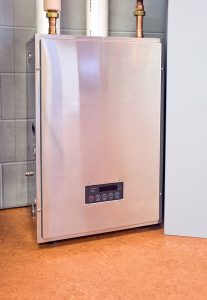Either a gas burner or an electric element heats the water.
Tankless versus tank water heater 2016.
According to energy gov for homes that use 41 gallons or less of hot water daily demand or tankless water heaters can be 24 to 34 more energy efficient than conventional storage tank water heaters tankless water heaters if gas fired will save homeowners over 100 annually the longer they remain in service.
Whereas traditional water heater installation costs around 500 tankless installation costs double or more.
If you fill a large soaking tub each night with hot water and use more water for washing machines dishwashers and showers throughout the day a tank style heater comes out ahead.
Installation will cost you more at least 800 to.
The operational life of a tankless water heater is usually 20 years if not more.
Plus the larger electric tank will experience greater standby losses due to its greater surface area.
New storage tank water heaters are required to operate more efficiently and tankless on demand water heaters are even more efficient than that.
Tankless water heaters tend to cost more up front than storage tank models.
The nine models in our tests range from 525 to 1 150.
Propane storage tanks efficiency and smaller size can free up valuable space.
Tank water heaters typically cost less than tankless water heaters.
Tankless water heaters are more compact and can heat up water as you use it.
Tank hot water heaters consumer reports found gas fired tankless heaters ranged from 800 1 150 compared to regular storage tank models in the 300 480 range.
If a customer is looking to eliminate the footprint of a storage tank entirely a tankless water heater may be their best option.
Tankless water heaters heat water directly without the use of a storage tank.
With regular maintenance and repairs a tankless system may last up to 30 years or up to 3 times longer than a traditional hot water heater.
When testing tankless vs.
For a tank based traditional hot water system the lifespan is usually 10 years.
It uses high powered burners to rapidly heat water as it runs through a heat exchanger and deliver it directly to your faucets or shower without storing it in a tank.

